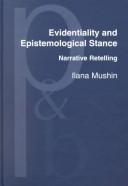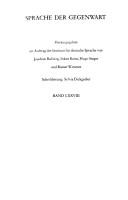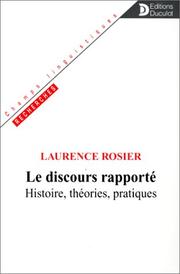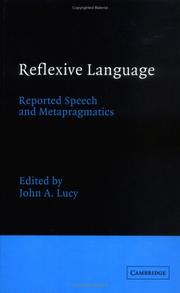| Listing 1 - 10 of 17 | << page >> |
Sort by
|
Book
ISBN: 9789027207777 9789027260567 9027207771 9027260567 Year: 2020 Publisher: Amsterdam John Benjamins Publishing Company
Abstract | Keywords | Export | Availability | Bookmark
 Loading...
Loading...Choose an application
- Reference Manager
- EndNote
- RefWorks (Direct export to RefWorks)
"Indirectness has been a key concept in pragmatic research for over four decades, however the notion as a technical term does not have an agreed-upon definition and remains vague and ambiguous. In this collection, indirectness is examined as a way of communicating meaning that is inferred from textual, contextual and intertextual meaning units. Emphasis is placed on the way in which indirectness serves the representation of diverse voices in the text, and this is examined through three main prisms: (1) the inferential view focuses on textual and contextual cues from which pragmatic indirect meanings might be inferred; (2) the dialogic-intertextual view focuses on dialogic and intertextual cues according to which different voices (social, ideological, literary etc.) are identified in the text; and (3) the functional view focuses on the pragmatic-rhetorical functions fulfilled by indirectness of both kinds"--
Pragmatics --- Grammar, Comparative and general --- Indirect discourse (Grammar) --- Indirect quotation (Grammar) --- Indirect speech (Grammar) --- Reported speech (Grammar) --- Discourse analysis --- Narration (Rhetoric) --- Indirect discourse --- Indirect quotation --- Reported speech --- Linguistics --- Philology

ISBN: 0792307925 9401074259 940092061X Year: 1990 Publisher: Dordrecht Kluwer
Abstract | Keywords | Export | Availability | Bookmark
 Loading...
Loading...Choose an application
- Reference Manager
- EndNote
- RefWorks (Direct export to RefWorks)
Grammar --- Pragmatics --- Grammar, Comparative and general --- -Reference (Linguistics) --- Signification (Linguistics) --- Linguistics --- Onomasiology --- Semantics --- Comparative grammar --- Grammar, Philosophical --- Grammar, Universal --- Language and languages --- Philosophical grammar --- Philology --- Indirect discourse --- Grammar, Comparative --- Reference (Linguistics) --- Indirect discourse (Grammar) --- Indirect quotation (Grammar) --- Indirect speech (Grammar) --- Reported speech (Grammar) --- Indirect quotation --- Reported speech --- Discourse analysis --- Narration (Rhetoric)
Book
ISBN: 9004274898 9789004274891 9789004273207 9004273204 1306976979 Year: 2014 Publisher: Brill
Abstract | Keywords | Export | Availability | Bookmark
 Loading...
Loading...Choose an application
- Reference Manager
- EndNote
- RefWorks (Direct export to RefWorks)
In The Representation of Speech Events in Chariton's Callirhoe and the Acts of the Apostles , Adrian T. Smith summarizes cross-linguistic research on how and why narrators vary the formulae that introduce direct speech. This research is applied to Chariton and to Acts. The findings demonstrate that narrators vary quotation formulae for numerous pragmatic purposes, including the tracking of conversational dynamics via a set of 'marked' and 'unmarked' quotation devices.
Grammar, Comparative and general --- Speech acts (Linguistics) --- Discourse markers. --- Discourse connectives --- Discourse particles --- Pragmatic markers --- Pragmatic particles --- Discourse analysis --- Pragmatics --- Indirect discourse (Grammar) --- Indirect quotation (Grammar) --- Indirect speech (Grammar) --- Reported speech (Grammar) --- Narration (Rhetoric) --- Indirect discourse. --- Religious aspects. --- Indirect quotation --- Reported speech --- Chariton. --- Bible. --- Acts (Book of the New Testament) --- Acts of the Apostles --- Chongdo haengjŏn --- Sado haengjŏn --- Linguistics --- Philology

ISBN: 9027251061 1588110338 9786612162466 1282162462 9027298122 9789027298126 9781588110336 9789027251060 9781282162464 Year: 2001 Volume: 87 Publisher: Amsterdam ; Philadelphia : John Benjamins Pub. Co.,
Abstract | Keywords | Export | Availability | Bookmark
 Loading...
Loading...Choose an application
- Reference Manager
- EndNote
- RefWorks (Direct export to RefWorks)
This book explores the discourse pragmatics of reportive evidentiality in Macedonian, Japanese and English through an empirical study of evidential strategies in narrative retelling. The patterns of evidential use (and non-use) found in these languages are attributed to contextual, cultural and grammatical factors that motivate the adoption of an 'epistemological stance' - a concept that owes much to recent trends in Cognitive Linguistics. The patterns of evidential strategies found in the three languages provide a fine illustration of the balancing act between speakers' expressions of their own subjectivity, their motivations to tell a coherent and exciting story, and their motivations to be faithful retellers of someone elses' story. These pressures are further complicated by the grammatical and pragmatic conventions that are particular to each language. Evidentiality and Epistemological Stance: narrative retelling will appeal to those interested in evidentiality, grammar and pragmatics, cross-linguistics discourse analysis, linguistic subjectivity and narrative.
Discourse analysis, Narrative --- Grammar, Comparative and general --- -Knowledge, Theory of --- Epistemology --- Theory of knowledge --- Philosophy --- Psychology --- Narrative discourse analysis --- Narration (Rhetoric) --- Comparative grammar --- Grammar --- Grammar, Philosophical --- Grammar, Universal --- Language and languages --- Philosophical grammar --- Linguistics --- Philology --- Indirect discourse --- Grammar, Comparative --- Pragmatics --- Discourse analysis, Narrative. --- Indirect discourse. --- Knowledge, Theory of --- Discours narratif --- Discours indirect --- Théorie de la connaissance --- Indirect discourse (Grammar) --- Indirect quotation (Grammar) --- Indirect speech (Grammar) --- Reported speech (Grammar) --- Discourse analysis --- Indirect quotation --- Reported speech --- Knowledge, Theory of. --- LANGUAGE ARTS & DISCIPLINES --- Linguistics / General

ISBN: 3590156783 9783590156784 Year: 1989 Volume: 78 Publisher: Düsseldorf: Schwann,
Abstract | Keywords | Export | Availability | Bookmark
 Loading...
Loading...Choose an application
- Reference Manager
- EndNote
- RefWorks (Direct export to RefWorks)
German language --- Pragmatics --- Interviewing --- Grammar, Comparative and general --- Conversation --- Oral communication --- Indirect discourse --- -Conversation --- Oral transmission --- Speech communication --- Verbal communication --- Communication --- Talking --- Colloquial language --- Etiquette --- Comparative grammar --- Grammar --- Grammar, Philosophical --- Grammar, Universal --- Language and languages --- Philosophical grammar --- Linguistics --- Philology --- Questioning --- Counseling --- Focus groups --- Interviews --- Social case work --- Grammar, Comparative --- Indirect discourse (Grammar) --- Indirect quotation (Grammar) --- Indirect speech (Grammar) --- Reported speech (Grammar) --- Indirect quotation --- Reported speech --- Discourse analysis --- Narration (Rhetoric) --- Grammar, Comparative and general - Indirect discourse
Book
ISBN: 1283857324 3110293501 9783110293500 9781283857321 9783110292107 3110292106 Year: 2012 Publisher: Berlin ; Boston : De Gruyter,
Abstract | Keywords | Export | Availability | Bookmark
 Loading...
Loading...Choose an application
- Reference Manager
- EndNote
- RefWorks (Direct export to RefWorks)
This volume brings together novel analyses of verbal plurality and distributivity. The contributions draw on a wide range of new empirical data from languages as diverse as Arabic, Cusco Quechua, European Portuguese, Hausa, Karitiana, Modern Hebrew and Russian. The introductory chapter gives an overview of the central issues that underlie much recent research on the semantics of event plurality. The papers on verbal plurality explore the interaction between verbal plurality and plural arguments in Arabic and European Portuguese, the semantics of additive particles in Modern Hebrew, the semantics of a range of pluractional markers in Cusco Quechua and the morphological variability of pluractional markers cross-linguistically. The papers on distributivity examine the syntax and semantics of reduplicated numerals in Karitiana and adnominal distributive markers. This volume will be of interest to researchers and students in syntax, formal semantics, and language typology.
Definiteness (Linguistics) --- Grammar, Comparative and general --- Discourse markers. --- Semantics. --- Formal semantics --- Semasiology --- Semiology (Semantics) --- Comparative linguistics --- Information theory --- Language and languages --- Lexicology --- Meaning (Psychology) --- Discourse connectives --- Discourse particles --- Pragmatic markers --- Pragmatic particles --- Discourse analysis --- Pragmatics --- Indirect discourse (Grammar) --- Indirect quotation (Grammar) --- Indirect speech (Grammar) --- Reported speech (Grammar) --- Narration (Rhetoric) --- Aspect (Linguistics) --- Indefiniteness (Linguistics) --- Linguistics --- Numerals. --- Aspect. --- Indirect discourse. --- Indirect quotation --- Reported speech --- Verbal aspect --- Temporal constructions --- Verb --- Nominals --- Determiners --- Philology --- Morphology, semantics, syntax, distributivity, verbal plurality.
Book
ISBN: 9789027256041 9789027287656 9027287651 1282897322 9781282897328 9027256047 9786612897320 6612897325 Year: 2010 Publisher: Amsterdam ; Philadelphia : John Benjamins Pub. Co.,
Abstract | Keywords | Export | Availability | Bookmark
 Loading...
Loading...Choose an application
- Reference Manager
- EndNote
- RefWorks (Direct export to RefWorks)
Based on the analysis of conversations between French and Australian English speakers discussing various topics, including their experiences as non-native speakers in France or Australia, this book combines subjective personal testimonies with an objective linguistic analysis of the expression of opinion in discourse. It offers a new perspective on French and Australian English interactional style by examining the discourse markers I think, je pense, je crois and je trouve. It is shown that the prosody, intonation unit position, and the surrounding context of these markers are all fundamental to their function and meaning in interaction. In addition, this book offers the first detailed comparative semantic study of the three comparative French expressions in interaction.The book will appeal to all those interested in linguistics, French and Australian English interactional style, cross-cultural communication, and discourse analysis. Students and teachers of French will be interested in the semantic analysis of the French expressions, the authentic interactional data and the personal testimonies of the participants.
Lexicology. Semantics --- Grammar --- Pragmatics --- English language --- French language --- Discourse markers --- Grammar, Comparative and general --- Semantics --- Formal semantics --- Semasiology --- Semiology (Semantics) --- Comparative linguistics --- Information theory --- Language and languages --- Lexicology --- Meaning (Psychology) --- Indirect discourse (Grammar) --- Indirect quotation (Grammar) --- Indirect speech (Grammar) --- Reported speech (Grammar) --- Discourse analysis --- Narration (Rhetoric) --- Germanic languages --- Discourse connectives --- Discourse particles --- Pragmatic markers --- Pragmatic particles --- Indirect discourse --- Indirect quotation --- Reported speech --- Discourse markers. --- Semantics. --- Discourse analysis. --- Indirect discourse. --- Linguistics --- Philology

ISBN: 2801112054 9782801112052 Year: 1999 Volume: *16 Publisher: Paris: De Boeck et Larcier,
Abstract | Keywords | Export | Availability | Bookmark
 Loading...
Loading...Choose an application
- Reference Manager
- EndNote
- RefWorks (Direct export to RefWorks)
French language --- Pragmatics --- Linguistique --- Taalkunde --- Grammar, Comparative and general --- Discourse analysis --- Discours indirect --- Français (Langue) --- Analyse du discours --- Indirect discourse --- Free indirect speech. --- Indirect discourse. --- Free indirect speech --- -#KVHA:Grammatica; Frans --- #KVHA:Linguistiek; Frans --- Comparative grammar --- Grammar --- Grammar, Philosophical --- Grammar, Universal --- Language and languages --- Philosophical grammar --- Linguistics --- Philology --- Free indirect style --- Indirect speech, Free --- Speech, Free indirect --- Fiction --- Indirect discourse in literature --- Narration (Rhetoric) --- Grammar, Comparative --- Technique --- Français (Langue) --- #KVHA:Grammatica; Frans --- Indirect discourse (Grammar) --- Indirect quotation (Grammar) --- Indirect speech (Grammar) --- Reported speech (Grammar) --- Indirect quotation --- Reported speech --- Indirect reason --- Grammar, Comparative and general - Indirect discourse.

ISBN: 0521351642 0511621035 9780521351645 9780511621031 Year: 1993 Publisher: Cambridge : Cambridge university press,
Abstract | Keywords | Export | Availability | Bookmark
 Loading...
Loading...Choose an application
- Reference Manager
- EndNote
- RefWorks (Direct export to RefWorks)
This volume examines the nature and significance of the reflexive aspect of natural language, its capacity to represent its own structure and use through reported speech and explicit statements about language-use (metapragmatics). It adopts a truly interdisciplinary approach. Part I contains papers outlining the volume's theoretical scope. Parts II and III contain anthropological case studies which show the formal devices behind reflexive usage in a variety of different languages and how they function in cultural life. Finally, Part IV shows the importance of understanding reflexive language in many other areas of the humanities and social sciences, including philosophy, psychology, religious studies, sociology and literary studies. Many of the contributors are senior scholars of international reputation: all are innovative researchers. Cumulatively their work here represents a critique of those researchers in the humanities and social sciences who fail to take language seriously both in the lives of those they study and in their own research practices.
Grammar --- Pragmatics --- Metalanguage --- Metataal --- Métalangage --- Métalangue --- Pragmatiek --- Pragmatique --- Metalanguage. --- Pragmatics. --- Grammar, Comparative and general --- Indirect discourse. --- -Metalanguage --- Pragmalinguistics --- General semantics --- Language and languages --- Logic, Symbolic and mathematical --- Semantics (Philosophy) --- Second-order language --- Linguistic analysis (Linguistics) --- Comparative grammar --- Grammar, Philosophical --- Grammar, Universal --- Philosophical grammar --- Linguistics --- Philology --- Indirect discourse --- Philosophy --- Grammar, Comparative --- Grammar [Comparative and general ] --- Indirect reason --- Grammar, Comparative and general - Indirect discourse. --- Indirect discourse (Grammar) --- Indirect quotation (Grammar) --- Indirect speech (Grammar) --- Reported speech (Grammar) --- Discourse analysis --- Narration (Rhetoric) --- Indirect quotation --- Reported speech --- Arts and Humanities --- Language & Linguistics --- Acqui 2006 --- Linguistique --- Metalangue --- PHILOSOPHIE DU LANGAGE --- METALANGAGE --- GRAMMAIRE COMPAREE ET GENERALE --- DISCOURS INDIRECT --- CONSTRUCTIONS REFLECHIES (LINGUISTIQUE) --- Recherche
Book
ISBN: 9783110292107 Year: 2012 Volume: 546 Publisher: Berlin ; Boston De Gruyter
Abstract | Keywords | Export | Availability | Bookmark
 Loading...
Loading...Choose an application
- Reference Manager
- EndNote
- RefWorks (Direct export to RefWorks)
This volume brings together novel analyses of verbal plurality and distributivity. The contributions draw on a wide range of new empirical data from languages as diverse as Arabic, Cusco Quechua, European Portuguese, Hausa, Karitiana, Modern Hebrew and Russian. The introductory chapter gives an overview of the central issues that underlie much recent research on the semantics of event plurality. The papers on verbal plurality explore the interaction between verbal plurality and plural arguments in Arabic and European Portuguese, the semantics of additive particles in Modern Hebrew, the semantics of a range of pluractional markers in Cusco Quechua and the morphological variability of pluractional markers cross-linguistically. The papers on distributivity examine the syntax and semantics of reduplicated numerals in Karitiana and adnominal distributive markers. This volume will be of interest to researchers and students in syntax, formal semantics, and language typology.
Numéraux (linguistique) --- Aspect (linguistique) --- Discours indirect --- Marqueurs discursifs --- Definiteness (Linguistics) --- Grammar, Comparative and general --- Discourse markers. --- Semantics. --- Numerals. --- Aspect. --- Indirect discourse. --- Discourse markers --- Semantics --- Formal semantics --- Semasiology --- Semiology (Semantics) --- Comparative linguistics --- Information theory --- Language and languages --- Lexicology --- Meaning (Psychology) --- Indirect discourse (Grammar) --- Indirect quotation (Grammar) --- Indirect speech (Grammar) --- Reported speech (Grammar) --- Discourse analysis --- Narration (Rhetoric) --- Aspect (Linguistics) --- Discourse connectives --- Discourse particles --- Pragmatic markers --- Pragmatic particles --- Pragmatics --- Indefiniteness (Linguistics) --- Linguistics --- Aspect --- Indirect discourse --- Numerals --- Nominals --- Indirect quotation --- Reported speech --- Verbal aspect --- Temporal constructions --- Verb --- Determiners --- Discours indirect. --- Marqueurs discursifs. --- Philology --- Numéraux (linguistique)
| Listing 1 - 10 of 17 | << page >> |
Sort by
|

 Search
Search Feedback
Feedback About UniCat
About UniCat  Help
Help News
News